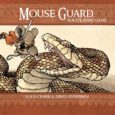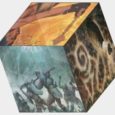 Facilitator: John Aegard
Facilitator: John Aegard
Players: Victoria Garcia, Sean Nittner, James Lawton, Adrienne Mueller
System: Nightsegur (mash up of Night Witches and Montsegur 1244)
Wow, this game looked great, and it delivered on that promise! Here’s John’s pitch from the forum:
This is a GMless tabletop freeform game with rules based on the game “Montsegur.” It tells the story of the “Night Witches” — heroic young Soviet airwomen caught between the terrors of the Nazi war machine, the paranoid Soviet secret police, and the institutional sexism of their own military.
The game covers four years of history, from the dark days of 1942 through the ultimate triumph of 1945. It deliberately de-emphasizes the military action. We know the war only through the very sudden absence of its casualties, some of whom we will be forbidden to mourn.
This setting is loaded with awful stuff — brutal violence, paranoid and bullying military cops, sexism, queerphobia. For safety’s sake, we will be playing with an x-card
As with Montsegur, all characters are premade and preloaded into a relationship map. Each player will play an airwoman and a member of the ground crew.
From talking to John, we shared this in common. We love Night Witches but the game is best done over a campaign. Multiple missions, multiple waystations. He wanted a game that not only played through the whole war, but also focused on the lives of the airwomen and the ground crew almost exclusively. The extent of the missions played out “in game” was that each turn you selected a scene (from a list of three available) and if the scene card you replaced it with had a skull on it your air woman didn’t make it back after that night’s mission. Simple and brutal.
The Story by Adrienne Mueller
Adrienne did an amazing write up on the GPNW forums, which I’m going to copy in full (with permission) here. Her write up is on the GPNW forum here.
– Rada is a young idealist who promulgates the democracy of the people whenever she gets the chance. She earns many medals and eventually leads the regiment. She ends the war as a hero and continues to tow the party line for many years thereafter.
– Valya barely had a chance to fly before she was run over by one of our own aircraft – flown by Rada, no less. The loss of Roman had hit Valya hard and whether her blundering onto the runway was intentional or caused by drink, we’ll never know.
– Yana likes her vodka and likes Zoryana too. She advocates for stealing from the men and for burying the bomb. She avoids Zoryana for a while after Valya’s death, but eventually they kiss and make up. But then Yana also kisses Agafonika and their relationship never recovers.
– Polya staunchly insists that Rita is too near-sighted to fly; but she is persuaded that Nina should be given a plane again and leads a ‘salvage’ mission to get the parts. She also lays in to the useless poet Konstantin – to everyone’s amusement except Sonya at the NKVD. Eventually, after the slaughter of several POWs before they can be interrogated, the NKVD takes her out.
– Färidä is pushing to get her sister back on flight-duty from the get go. Once Polya is out of the picture and Färidä is granted the finest medal Russia has to offer, she succeeds. Her plane goes missing after Rita fails her, but she makes it back alive. One of her darkest moments is when she needs to shoot one of the prisoners she’s trying to loot – and then watches them all get slaughtered by Arkady.
– Rita pushes to rat out Roman and helps Nina pick up NKVD documents from the mud. Eventually her sister gets her her chance to fly again, but she’s so tired from still also being a mechanic that she fucks up. Also, turns out she was too near-sighted to be let in the air and she doesn’t make it back.
– In the beginning, Taline urged the other members of the ground crew to protect Roman and then urged Spartak to get us more uniforms, or at least some soap. By the time we got to the Balkan she was delivering lackluster pre-written sermons on cleanliness. She tried very hard to stop the runway workers from requisitioning our food, but had to cave.
– Zoryana was obliged to clean the bloody uniform of Valya. Much later, she and Yana rekindled their passion, but that was cut short when Yana betrayed her. Zoryana was also sent to the NKVD, but she made it pack only a little worse for wear.
– Nina had no problem giving info to the NKVD – she knew what happened to people who didn’t comply. She worked her butt off for them. Her reward came when Färidä persuaded Polya to help rig up a plane for her. She even got a spiffy looking replacement-leg. She was a source of inspiration to the troops. But the NKVD got her in the end. Maybe it was the coverup from the unexploded bomb. Maybe it was her pointing fingers at a dead woman. Who can say?- Spartak helped Zoryana wash out Valya’s blood and then helped Nina pick-up papers. She was disgusted by inefficiency and by people lacking the right information and used her power to make things better for the women.
– Konstantin was a young, rich, poet who got brutal lessons first when Polya dressed him down, then when she sent him up in a plane, then when she forced him to clean a frozen, overflowing latrine.
– Arkady went crazy when he was confronted with some German prisoners. He was never seen again.
– Agafonika had some fun with Yana and then tried to cover-up the affairs in the regiment. Eventually she had to throw Zoryana under the bus, though.Game:
Nightsegur is a hybrid of Night Witches by Jason Morningstar and Montsegur 1244 by Frederik Jensen. It takes the theme of Night Witches and applies it to the one-shot delivery system of Montsegur. Players each play two characters: a pilot and a groundperson. We follow them over four successive acts which span the period of World War II. There is attrition as time passes; either from the Germans or from sentencing by the Soviet NKVD for crimes against the motherland. Each player uses a scene-card, with a bit of evocative description on it, to help set a scene that would take place against the backdrop of a given act. Characters have the opportunity to rat out their fellows at the end of every act. In the end, epilogues are delivered for whoever has survived.
Thoughts:
EDITED – Decided I wanted to strip out some of the more play-testy feedback so that could go straight to Johnzo.
– Loved how the NKVD took out more of us than the Germans.
– Unlike Montsegur, the story-arc goes kind of goes from negative to positive instead of positive to negative. We’re winning the war. So really things could be more hopeful at the end; but I’m so used to narrative one-shots like this ending in tragedy, it’s hard for me to do.
– Love the NKVD incrimination and draws.
– Sorry I made Roman into such a jerk. It’s the way I chose to interpret the question on my card, but I think he was maybe supposed to be more of a clown character.
– We usually used our turn to set scenes for other people’s characters and left our own characters out. This was great because we had a lot of latitude for what scenes to do. It was less good, for me, because I also wanted to talk about things my characters were feeling/thinking and I wanted them to interact with other characters in particular ways. But – I wanted to hear about other characters that I hadn’t seen in a while more. Later in the game we use our stored ‘scene cards’ to add in more scenes that could help flesh things out, but by then precious setup/characterization time had been lost. Don’t think this was an issue for other players and doubt this would happen in most games.
– Loved the map and flavor.
– We didn’t narrate around the deaths so much, though I think we were supposed to. In hindsight was kind of missing that.
– Someone please make a tiny plane figure as the map token – that perhaps can lose wheels and propellers and wing-pieces as the war progresses.
– Wished Rita had had a scene with her sister! To at least thank her for getting her back in the cockpit.
Favourite Bits:
– When Sonya reminded us that we had just been lectured about cleanliness, after the latrine overflowed.
– The gentle touch on the wrist from Agafonika. (Took me by surprise and I loved it!)
– The suspense of who would be drawn from the envelope.
– The deeply disturbing swimming hole scene. Not because I relished the content, but because I don’t think I’ve ever gotten such a strong feeling of foreboding in a game.
– Zolyana telling Yana we should live in the moment because it’s all we have.
– Färidä advocating so hard for Rita!
– Spartak telling NKVD to draw a grid. So smart. So commanding.
– Polya tearing into the poet about how useless he is and how he should get himself a gun, or get in a plane, or get to shoveling shit.
– Nadia’s plane-leg! What a cool touch and how wonderful that she was overcoming her disability in this shitty place in this shitty war.
– That Rada was able to be persuaded by Färidä’s argument to let Rita fly! Stuck to her morals!
This was a great experience, people! Check it out: http://john.aegard.com/!
Thanks so much for making it and facilitating it for us, Johnzo!
What Rocked
What could have improved
This game is really strong. The few improvements I can think of which we talked to John about were:
- It’s entirely possible for a player to lose both characters (I did). In that event, I think someone with two characters left should just give them one. I doubt it would detract from immersion at all.
- The denouncements were initially one per characters but that quickly seemed overwhelming and John switched it to one per player, which I think is much more manageable.

